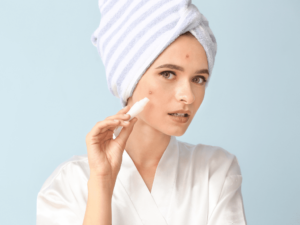Fall and winter are often two of the more challenging seasons for those with dry and sensitive skin, thanks to colder, drier weather.
But you don’t have to let the elements rule your skin–if you know what to avoid or limit, you can keep your sensitive skin healthy, glowing, and hydrated as the leaves turn yellow and the nights get cooler.
What causes skin irritation and how can we manage it?
Hot Water
Some of us may cleanse more than usual during the hot and sweaty summer; however, as fall approaches, it’s important to cut down on hot water usage, since it can dry out your sensitive skin. Limit face washing to twice daily and showers to once daily. If you have really dry skin, it’s even okay to skip out on your morning cleanse. And although it’s nice to step into a steaming hot shower when the weather outside is frightful, try to limit bathing time to less than 10 minutes and keep water warm, but not super hot.

Harsh Soaps
Regular bar soap can be harsh on sensitive skin and strip the skin of its natural oils. Because sensitive skin is more likely to be dryer in colder months, limit soap use to areas that tend to sweat more, like the underarms and buttocks. Look for soaps specifically designed to be gentle on skin, or non-foaming cleansers that are thicker in consistency. These help to preserve hydration and won’t be too harsh on your skin.
Rough Fabrics
Although wool or synthetic fiber add warmth on cold winter days, these materials can often irritate sensitive skin with their thick, scratchy texture. Instead, consider layering with silk or cotton material that’s more breathable and comfortable. Even soft clothes can irritate skin, though, if they’re washed with a harsh detergent. Try using a laundry detergent specifically made for sensitive skin so you don’t end up with aggravating dyes or fragrances in your clothing.
Fragrances
At some point in the fall (or even late summer), the air becomes perfumed with the smell of pumpkin spice. Unfortunately, although it’s tempting to load up on fall and winter-y scented everything, these fragrances are not so nice for your skin. Resist the urge to lather on a cinnamon roll-smelling body wash or a Christmas tree-flavored lotion; these fragrances will irritate sensitive skin and can do more harm than good. Instead, stick to fragrance-free products and pick up an extra pumpkin spice latte to get your fix.
Heavy Exfoliation
Exfoliating is a great way to remove dead skin. But overdoing it will leave your sensitive skin red, irritated, and rashy. Limit physical exfoliating scrubs to once weekly or even twice monthly. You can substitute with a gentler exfoliating moisturizer containing alpha hydroxy acids, which work to remove the top layers of dead, flaky skin cells. They can also boost skin thickness, which results in firmer, stronger skin.

With colder weather often comes irritated, dry, sensitive skin–but it doesn’t have to be that way! Once you know what bothers your sensitive skin, you can better prepare for cooler months and make sure your skin stays hydrated, healthy, and happy no matter what the season brings
Eczema
Eczema (atopic dermatitis) affects your skin’s ability to protect you from irritants, like germs in the air or chemicals in your laundry detergent. This can make you extra sensitive to products that don’t bother other people, like soaps and cosmetics.
The symptoms of eczema vary widely from person to person. You could notice any of the following:
- dryness
- itchiness
- small bumps that may leak fluid and crust over
- red to brownish-gray patches of skin
- raw, swollen skin
- thick, cracked, or scaly skin
What you can do
Sometimes over-the-counter (OTC) anti-itch creams and moisturizers are enough to ease symptoms. If your symptoms are severe, see your healthcare provider.
Products you can use
If you have eczema, it’s important to choose sensitive products that won’t irritate your skin:
- Moisturizers. Try using a moisturizer, like EMOLLIENCE. RESTORATIVE MOISTURIZER, that contains key ingredients that can help form a protective layer over your skin.
- Detergents. Try switching to a fragrance-free, hypoallergenic laundry detergent.
- Anti-itch creams.
Irritant contact dermatitis
Irritant contact dermatitis is a red, itchy rash that develops when the protective layer of your skin is damaged by something it touches.
In most cases, a rash will only develop on the area that directly touches the irritant.
Symptoms include:
- red rash
- itchiness
- dry, cracked, scaly skin
- bumps and blisters, which may ooze fluid and crust over
- swelling
- burning
- tenderness
What you can do
Contact dermatitis usually clears up on its own within a few weeks. The most important thing you can do is figure out what triggered the reaction so that you can avoid it in the future.
Products you can use
You’ll want to control the itching while your skin heals. Scratching the area will only make it more inflamed.
- Steroid creams. An OTC hydrocortisone cream can help reduce inflammation and eliminate itch.
- Numbing creams. Some anti-itch creams contain a topical numbing agent that relieves itchiness and burning.
- Soothing bath. A cool oatmeal bath can sooth blistered, burning skin. Try a soothing bath treatment, or make your own by grinding oatmeal into a fine powder.

Allergic contact dermatitis
Allergic contact dermatitis is a less common form of contact dermatitis. It occurs when you have an allergic reaction to a specific substance.
Symptoms include:
- redness
- itchiness
- blisters and bumps, sometimes containing fluid
- burning
- swelling
- tenderness
Common allergens include:
- soaps
- lotions
- plants
- jewelry
- fragrances
- cosmetics
- nickel (in jewelry)
Allergic contact dermatitis should be distinguished from:
- Irritant contact dermatitis, which is due to irritation or repetitive injury to the skin. Irritants include water, soaps, detergents, solvents, acids, alkalis, and friction. Irritant contact dermatitis may affect anyone, providing they have had enough exposure to the irritant, but those with atopic dermatitis are particularly sensitive. Most cases of hand dermatitis are due to contact with irritants. Irritant contact dermatitis can occur immediately after a single injury or develop slowly after repeated exposure to an irritant.
- Other forms of dermatitis, which may mimic allergic contact dermatitis.
- Contact urticaria, in which a rash appears within minutes of exposure and fades away within minutes to hours. The allergic reaction to latex is the best-known example of allergic contact urticaria.
- Fungal infections; tinea corporis may present as a unilateral rash.
Prognosis depends on patient education and compliance in avoiding allergens and appropriate skin care.
What you can do
Treatment with an OTC antihistamine should help ease itching and inflammation. Try to identify the cause of your allergic reaction so you can avoid it in the future.
General tips for sensitive skin
When you have sensitive skin, it can feel like everything is irritating. But with a few lifestyle changes, you may see significant improvement.
Here are a few tips that can help anyone with sensitive skin:
- take short 5 to 10 minute showers with warm — not hot — water
- avoid harsh astringents and exfoliants
- use a gentle, fragrance-free soap
- use essential oils instead of perfumes
- use a gentle, fragrance-free laundry detergent
- try using organic cleaning supplies
- always use a shaving cream or gel
- gently pat yourself dry after a shower (instead of rubbing) and apply moisturizer right away
- test new products on a discreet area of skin at least one day before trying a full-application
What you can do
You can treat dry skin by returning moisture to the affected areas. Applying a moisturizing cream or ointment two to three times per day will help restore moisture and prevent your skin from drying out in the future. Try using a fragrance-free moisturizer designed for people with sensitive skin.
Products you can use
If you have dry skin, your skin care routine should focus on retaining moisture.
To cleanse:
- Use a gentle, soap-free cleanser that won’t wash away healthy oils.
To moisturize:
- Face. A gentle, fragrance-free, cream-based moisturizer can help lock in moisture and protect your skin all day long. Use esspecially designed high quality products for sensitive skin. A very good choice is LED AND CALMING FACIAL, that will help reduce inflammation, redness and sesitivity.
- Body. Try a natural oil that won’t irritate your skin. Shea butter is particularly soothing.
- Hands. Your hands are extra vulnerable to dry winter air. Keep them soft and smooth with a powerful moisturizer.





